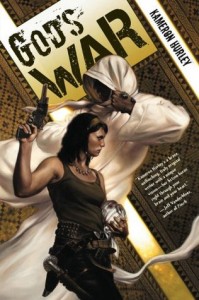 Title: God’s War (Bel Dame Apocrypha #1)
Title: God’s War (Bel Dame Apocrypha #1)
Author: Kameron Hurley
Publisher: Night Shade Books on January 26, 2010
Source: Purchased
On a ravaged, contaminated world, a centuries-old holy war rages, fought by a bloody mix of mercenaries, magicians, and conscripted soldiers.View Spoiler »
Gods’s War is a complex bio-punk with incredible world-building: magicians control bugs instead of magic, warfare is genetic, and women sell their wombs on the black market. You’re immediately thrown into the world of Umayma, a planet divided by a centuries old religious war and decimated by both environmental destruction and political violence.
Although there are many countries vying for supremacy on Umayma, the most prevalent (and the most violent) are Nasheen and Chenja. These countries are locked in a seemingly endless war driven by religious difference, mainly the interpretation of the same religious text. Sound familiar? Nasheenian and Chenjan societies are similar in many ways, but their differences are pronounced enough to warrant a holy war (apparently). For one, the treatment of the sexes in these two countries is clearly a foil for one another, as Chenjan men dominate cultural life while Nasheenian women run the show with bloody sophistication.
One of these bloody women is protagonist Nyx, a disgraced bounty hunter and war veteran. She and her team of employees work together to cut off the heads of those deemed criminals by Nasheen, primarily deserters. While they spend endless hours with her, none of her team members are really friends with Nyx. She is a hard woman, punishing in her hatred for the Chenjans she fought in the war and all those who’ve betrayed her. I loved her. The other main character, Rhys, was a different story. A Chenjan refugee, he works as a magician in Nyx’s employ despite his sub-par abilities. He’s super pious and I quickly tired of him lording his religious superiority over everyone. I did feel bad for him though, since he is persecuted both because of his nationality and because he’s a man in Nasheen.
Hurley’s attention to detail is obvious here, as she crafts slang for Nasheenians that reflects their political climate. Nyx and many others use the phrase “my woman,” which seems to be the equivalent of “bro,” to address one another. I’d normally be all over this emphasis on matriarchy, but in Hurley’s world it has resulted in the abuse and exploitation of men. All men are required to fight in the war from puberty until they become senior citizens, resulting in what one characters calls “the genocide of a gender.”
The examination of gender and sex doesn’t end there, as LGBT rights also figure prominently. At one point Khos, a member of Nyx’s team, notes the hypocrisy of Nasheenian sexual laws: same sex relationships between women are celebrated while sexual relationships between men are illegal. This is just one of the moments where Hurley brilliantly critiques sexism is all its forms, both misandry and misogyny. There are no easy answers to questions of human rights in Nasheen or Chenja.
In her acknowledgements Hurley states that she wrote this book while she was dying – and it shows. Many of the characters in God’s War – but especially Nyx – attempt to grapple with their mortality and their many regrets. These characters are multi-dimensional and flawed, by turns violent, pious, self-righteous, and avenging. No one is particularly good, but they’re all very compelling. I think that’s what I liked best about my introduction to Kameron Hurley’s writing: her unflinchingly honest portrayal of the best and worst parts of people.
God’s War is grimdark without question, relentlessly subjecting both characters and reader to the horrors of war, sexism, and a multitude of other prejudices. Despite rating this book 4.5 stars, there were times when I just needed to put it aside and think about something else, something less bleak. Still, there was something visceral about it that I loved, and I’ll be recommending it to anyone who likes their SFF dark.